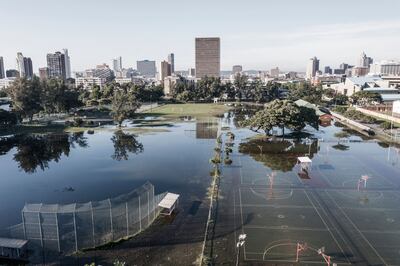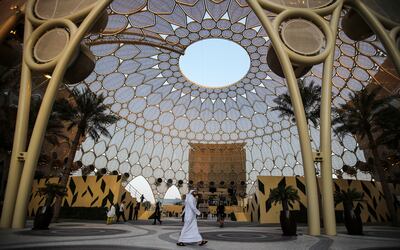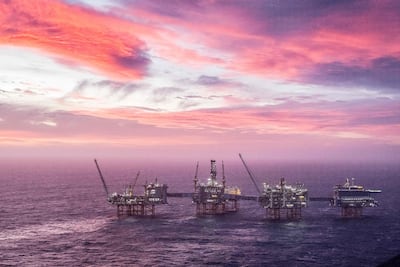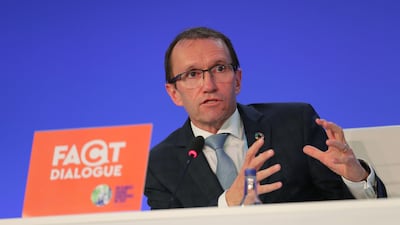Disappointed by uneven progress at the last round of global climate talks in Egypt, one of the key players at Cop28 is hoping for gains across the chessboard when the world assembles in Dubai in five weeks’ time.
Norway’s Foreign Minister Espen Barth Eide is wearing two hats before the summit: as a representative of the oil and gas-exporting Nordic country, and as a facilitator asked by the UAE to take soundings on what countries are thinking before Cop28.
In an interview with The National, he gave a cautiously upbeat verdict on those discussions – “so far, so good” – and set out Norway’s hopes for a summit that will need to "find the political response" to a series of dire climate warnings.
Tackling climate change is a triathlon of reducing emissions now (mitigation in UN jargon), preparing for extreme weather in the future (adaptation) and paying for disasters that can no longer be stopped (loss and damage).
The world struck a partial loss and damage deal at Cop27 in Egypt but Mr Eide was among those disappointed by meagre progress on emissions, arguing that if there is no more mitigation, the cost of the other two legs will only rise.
It means the world heads to Cop28 off track to limit global warming to 1.5°C, the world’s signature climate goal, beyond which scientists say the effects of flooding, heatwaves and other extreme weather would be much worse.
Mr Eide said it was positive to see a “real understanding that we need to move the whole mitigation agenda forward” when talks open at Dubai’s Expo City on November 30.
“We know that some parts of the world will put their main emphasis on mitigation,” he said. “Others will be reminding about the importance of financial support and some countries put a lot of emphasis on adaptation.
“We believe that a successful Cop requires genuine progress, moving forward, on all these issues.”

Speaking shortly after his promotion to the Foreign Ministry, where he is continuing in his Cop28 role, Mr Eide said:
- The UAE presidency is “very dedicated” to tackling key issues at Cop28
- The prospects of hitting 1.5°C are "better than they used to be" but global warming projections are "still significantly higher than they could be"
- “Most countries agree” on moving towards cleaner energy but there are differences of emphasis regarding renewables and fossil fuels
- Norway plans to keep exporting oil and gas while its European customers decarbonise
- His personal view is that the world will not reach its climate goals without using carbon capture to some degree
- The switch to electric vehicles has progressed so far in Norway that there is “hardly anybody left” who would buy a petrol or diesel model
Cop preparations
Mr Eide was asked by Dr Sultan Al Jaber, UAE Minister of Industry and Advanced Technology, and the President-designate of Cop28, to take informal soundings on mitigation in tandem with Singapore.
They will soon report back to a “pre-Cop” meeting in Abu Dhabi, with Mr Eide encouraged by an exchange of “substantive views” despite the “rather dramatic global circumstances” of conflict in Ukraine and Gaza.
“Most countries agree that we need to speak more seriously about the energy transition,” he said.
However, while “some countries will emphasise the new part – bringing in more renewables, more energy savings and more uses of green, renewable or otherwise non-emitting energies – some other countries want to be more explicit about the phase-down or phase-out of coal, oil and gas”.

The fossil fuel debate brought an acrimonious end to Cop26 in Glasgow, when India pushed through an amendment diluting a “phase-out” of coal to a “phase-down”.
A technical report prepared for Cop28, at which the world will carry out the first “global stocktake” of progress towards 1.5°C, suggests “phasing out all unabated fossil fuels” – a wording that is sure to provoke further discussion.
View from Norway
In his role as facilitator, Mr Eide expresses no view on these issues. But speaking with his Norwegian hat on, he says the world needs to rethink how it uses energy, moving beyond the “low-hanging fruit” of clean electricity into more challenging sectors such as steel production.
Norway, like the UAE, is an energy powerhouse that wants to remain one in the green age. It has a wealth fund worth $1.4 trillion from oil and gas revenue and is Europe’s leading gas supplier since ties were severed with Russia.
“Our view on this is that while Europe, which is our main market, decarbonises, they will still need some oil and especially gas,” said Mr Eide.
“We want to be part of that transition but we insist that it cannot only be a supply-side transition. It has to be demand-side as well, which means we have to change the way we use energy.”

Norway has abundant clean power from hydroelectric dams in its lakes and mountains, helping it motor ahead of its neighbours in the great electric car switch.
While the UK recently delayed its ban on petrol vehicles, in Norway there is “hardly anybody left who would buy a new fossil car”, Mr Eide said. While Norway does not use nuclear power, it supports other countries doing so.
The stocktake report is lukewarm on another climate change controversy, capturing carbon emissions to limit the damage from pollution. It calls carbon capture “an option” but says there are several challenges to resolve.
Mr Eide says his view is that “we will not be able to meet our climate targets without carbon capture”, but it should focus on sectors such as cement and waste where it is hard to use electricity.
“You can still say we should only use carbon capture and storage where you need to,” he said. “It’s not only a whether, but it’s also a what and how.”


